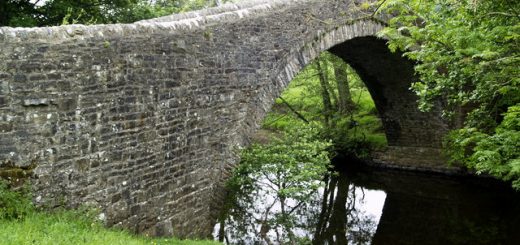Cranmere Pool
Robert Charles Hope tells us in ‘The Legendary Lore Of The Holy Wells Of England’ (1893) that ‘Cranmere Pool is believed to be a place of punishment for unhappy spirits, who are frequently to be heard wailing in the morasses which surround it’. Situated at a height of 1,837ft in the Okehampton Artillery Range, Cranmere Pool (possibly derived from The Lake of Cranes or Crow Meer) is the head of the West Okement River, though it is now described as little more than a depression that only fills after heavy rain.
 Robert Hope was probably referring to the legend associated with Cranmere Pool and the ghost of Benjamin Gayer (Benjie Gear, Cranmere Benjie) from Okehampton. Gayer was said to be a wealthy merchant and ship owner who fell upon hard times after several of his ships and cargo were lost to pirates. In order to regain his lost wealth he invested money from a fund he was entrusted with by the local community, a fund to pay the ransom of local mariners captured by pirates. Luck was not with Benjamin and again he lost the latest cargo he had invested the stolen funds in. His business was ruined, he was a broken man, he was unable to repay the money he had stolen, and, by his selfish actions, he had condemned many local sailors who were in the hands of pirates awaiting payment. The guilt played heavily on his soul, his health deteriorated and he died guilty and tormented. For months following his funeral the ghost of Benjamin Gayer haunted the streets of Okehampton, crying and wailing throughout each night. A series of exorcisms were attempted by all the local clergy trying unsuccessfully to lay the spirit of Gayer to rest. Just as things were looking desperate for the people of Okehampton, the Archdeacon called upon a wise priest who lived in a remote part of Dartmoor.
Robert Hope was probably referring to the legend associated with Cranmere Pool and the ghost of Benjamin Gayer (Benjie Gear, Cranmere Benjie) from Okehampton. Gayer was said to be a wealthy merchant and ship owner who fell upon hard times after several of his ships and cargo were lost to pirates. In order to regain his lost wealth he invested money from a fund he was entrusted with by the local community, a fund to pay the ransom of local mariners captured by pirates. Luck was not with Benjamin and again he lost the latest cargo he had invested the stolen funds in. His business was ruined, he was a broken man, he was unable to repay the money he had stolen, and, by his selfish actions, he had condemned many local sailors who were in the hands of pirates awaiting payment. The guilt played heavily on his soul, his health deteriorated and he died guilty and tormented. For months following his funeral the ghost of Benjamin Gayer haunted the streets of Okehampton, crying and wailing throughout each night. A series of exorcisms were attempted by all the local clergy trying unsuccessfully to lay the spirit of Gayer to rest. Just as things were looking desperate for the people of Okehampton, the Archdeacon called upon a wise priest who lived in a remote part of Dartmoor.
This priest confronted the ghost armed with a bridle and accompanied by a horseman. He commanded the ghost to depart using the Arabic tongue and Gayer conceded that he must leave the mortal world. But instead of fading away, he turned into a black horse. The horseman put the bridle on the horse and whipping him harshly rode him up onto the moor. As they approached Cranmere Pool he sent the horse hurtling into the waters whilst jumping off and removing the bridle. The mysterious priest then arrived binding the spirit of Gayer to the pool until he could empty it of water using nothing more than a sieve. Years passed as the spirit toiled at his hopeless task, trapped at Cranmere Pool, then one day he found a dead sheep and using its skin he lined his sieve and found that it then held water. He began to empty the pool. He threw the waters from Cranmere Pool into the River Okemont whose waters rose and burst their banks, flooding the town of Okehampton.
The priest was called again from his remote home and tasked with tackling Benjamin’s spirit at Cranmere Pool. This time the ghost was given a tougher challenge, to make trusses of grit tied with plaits created from sand, a task that he is still, according to legend attempting to complete. His ghost is said to be seen and heard by the pool and on the moor shaped as both a man and black horse.
This idea of trapping a spirit at a location by giving it a seemingly impossible task is one that appears in other tales. At Hound’s Pool, also on Dartmoor, a very similar story exists, where a weaver’s spirit was transformed by a minister of religion into a black hound and led to the pool where he was bound with the unending task of emptying it of water using a nut shell with a hole in it. On Bodmin Moor in Cornwall the tormented soul of Jan Treagle was ritually bound to Dozmary Pool and tasked to empty it with a leaking limpet shell.
Letter Box
![Nilfanion [CC BY-SA 3.0 (https://creativecommons.org/licenses/by-sa/3.0) or GFDL (http://www.gnu.org/copyleft/fdl.html)], from Wikimedia Commons](http://www.mysteriousbritain.co.uk/wp/wp-content/uploads/2012/02/800px-Cranmere_Pool_letterbox-300x204.jpg) A granite letter box can be found at Cranmere Pool which is thought to be the site of Dartmoors first letterbox and dates from 1854, having been established by James Perrott of Chagford, which back then was little more than a bottle in which cards could be deposited.
A granite letter box can be found at Cranmere Pool which is thought to be the site of Dartmoors first letterbox and dates from 1854, having been established by James Perrott of Chagford, which back then was little more than a bottle in which cards could be deposited.




Re: Cranmere Pool
The Haunted Homes and Family Traditions of Great Britain by John Ingram (1897)
In January 1884, Mr. James Spry sent an account to The Western Antiquary, of a supernatural being, popularly known as "Benjie Gear," which long troubled Okehampton and the neighbourhood with its pranks, and even now-a-days occasionally disturbs the good folks thereabouts. There is little in the legend connected with this apparition to distinguish it from many similar bits of folk-lore which crop up in most parts of England, but as a specimen of its class it is worth citation.
On the high gable end of an ancient house in Okehampton may be seen two gigantic iron letters, the initials of Benjamin Gayer, a former inhabitant. The house may readily be discovered, as it abuts on an irregular triangle formed by the houses behind the chantry. These initials, in italic capitals, are alluded to, in a local metrical version of the legend they commemorate, thus:
Behind the chantry mote be yred,
The initial scroll of the burgher dead.
Stout of heart they esteem the wight
"Who reads these letters at dead of night;
Though the moon be glinted back the while
From the oriel light of the chantry aisle :
Never pass but breathe a prayer
For the soul’s best peace on Master Gayer,
Tcedio vitoz quo confectus
Nunc ad ozthera transvectus,
Socius fuit qui sanctorum,
Ccelu gaudeat angelorum!
Where life’s troubled waters rest,
In the haven of the blest.
Mr. Spry suggests that the citizen thus commemorated may have been almoner of the money collected from the charitable of his time for the ransom of captives in Mohammedan lands, and that he may have appropriated such alms to his own use; hence his unsettled condition in the spirit "world. His reason for this opinion would appear to be this extract u from a note on the history of Okehampton":
" Mr. B. Gayer, with the philanthropy of a good burgess, as shown in his collections for the relief of poor Protestant prisoners in Turkey, would have been, but for these researches, a dead letter in the book of his little history : but tradition has preserved an ugly report of his own unquiet and imprisoned spirit. What child, or eke man or woman of our town, but has, some time or other, been terrified or amused at the story of Gayer the revenant ? "
Notwithstanding the statement that this old citizen Btill haunts his native place, he is declared to have been laid some years ago. Mr. Spry’s account is that Benjie Gear troubled the inhabitants of Okehampton to such an extent that "the aid of the Archdeacon was called in, and the clergy were assembled in order that the troubled spirit might be laid and cease to trouble them. There were twenty-three of the clergy who invoked him in various classic languages, but the insubordinate spirit refused to listen to their request. At length one, more learned than the rest, addressed him in Arabic, to which he was forced to succumb, saying, ‘Now thou art come, I must be gone!’ He was then compelled to take the form of a colt; a new bridle and bit, which had never been used, were procured, with a rider, to whom the Sacrament was administered. The man was directed to ride the colt to Cranmere Pool on Dartmoor, the following instructions being given him. He was to prevent the colt from turning its head towards the town until they were out of the Park, and then make straight for the Pool, and when he got to the slope, to slip from the colt’s back, pull the bridle off, and let him go. All this was dexterously performed, and the impetus thus gained by the animal with the intention of throwing the rider over its head into the Pool, accomplished its own fate."
As the citizens of Okehampton are still somewhat nervous on the score of meeting old "Benjie Gear’s" apparition, the "laying," after all, was, probably, only temporary, or not so well carried out as it should have been.